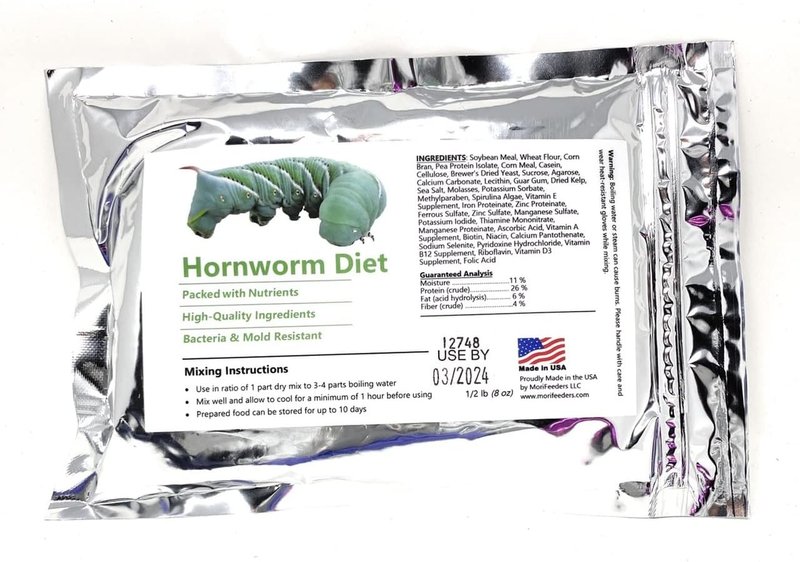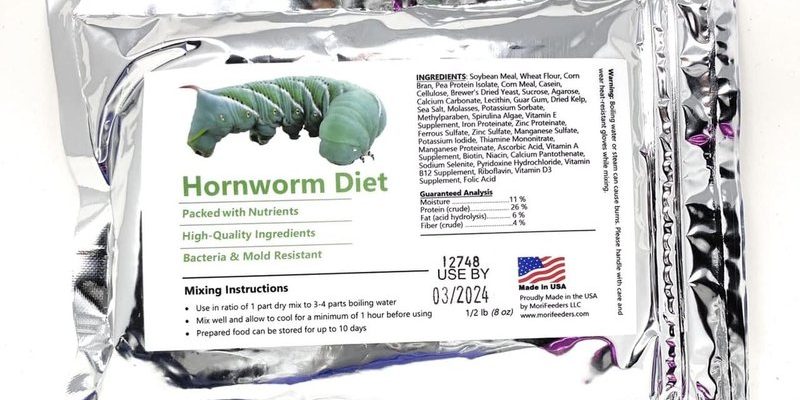
So, can hornworms be fed synthetic diets? The short answer is yes, but there’s more to it than just that. The synthetic diet has its pros and cons, and understanding these can help you make the best choice for your hornworms and the pets that eat them. Let’s dig deeper into what synthetic diets are, how they compare to natural feeds, and what you need to know if you’re considering this option.
What Are Synthetic Diets for Hornworms?
Synthetic diets are specially formulated food products designed to meet the nutritional needs of hornworms. Think of them as a balanced meal packed into an easy-to-use package. These diets usually come as pellets or powders that you mix with water to create a mushy feed. Brands like Hornworm Diet and Reptile Diet are popular choices among hobbyists.
One significant benefit of synthetic diets is consistency. When you use a synthetic diet, you know your hornworms are getting a precise mix of vitamins and nutrients every time. This can be especially important if you’re breeding multiple generations of hornworms, as it can help maintain their health and vigor.
However, it’s essential to understand that not all synthetic diets are created equal. Some are designed specifically for hornworms, while others might cater to a broader range of insects. Always check the label to ensure that what you’re feeding is suitable for hornworms.
Benefits of Feeding Hornworms Synthetic Diets
Feeding hornworms synthetic diets comes with several advantages. Here’s a look at a few key benefits:
- Convenience: Synthetic diets are easy to store and prepare. Just mix them with water, and you’re good to go. This can save time, especially if you have a lot of hornworms to feed.
- Nutritional Balance: A good synthetic diet will provide all the essential nutrients hornworms need to thrive. This balance can help ensure your hornworms grow healthy and strong.
- Consistency: With synthetic diets, you won’t have to worry about the variability in natural feeds. You can expect the same nutritional value in every batch, which is particularly important for breeders.
Of course, you might be wondering if there’s a downside. While these diets can offer convenience and balance, they might lack some of the natural flavors and textures that hornworms enjoy. Some hornworms might prefer fresh fruits and vegetables, and it can be hard to replicate that experience with a synthetic option.
The Drawbacks of Synthetic Diets for Hornworms
While there are many benefits, there are also some drawbacks to synthetic diets. Let’s explore a few of these:
- Potential Lack of Palatability: Some hornworms may find synthetic diets less appealing than fresh foods. It’s like trying to convince a kid to eat broccoli when they’d rather have pizza!
- Nutrient Absorption: Depending on the formulation, some synthetic diets may not be as easily digestible as natural feeds. This can affect how well hornworms absorb the nutrients.
- Cost: Quality synthetic diets can sometimes be pricier compared to bulk natural feeds. If you’re caring for a large number of hornworms, this can add up.
So, if you decide to go the synthetic route, keep an eye on how your hornworms respond. If they seem less interested in the feed, you might want to mix in some natural options to keep them happy and engaged.
How to Introduce Synthetic Diets to Hornworms
If you’re ready to try feeding your hornworms a synthetic diet, it’s good to introduce it gradually. Here’s how you can do that:
1. Start Slow: Begin by offering a small amount of the synthetic diet alongside their regular food. This can help your hornworms get used to the new taste without overwhelming them.
2. Observe Their Behavior: Watch how the hornworms react. Are they eating the synthetic diet, or are they leaving it behind? This observation can help you gauge their preference.
3. Gradually Increase: If they seem to enjoy the synthetic feed, you can slowly increase the amount while decreasing the natural options until you find a good balance.
Remember, every hornworm is different. Some may adapt quickly, while others might take more time. Being patient and observant will help you figure out the best feeding strategy.
Comparing Synthetic Diets with Natural Feeds
You might be curious about how synthetic diets stack up against natural feeds. Here’s a closer look:
| Aspect | Synthetic Diets | Natural Feeds |
|———————|————————————–|————————————|
| Nutritional Value | Generally balanced and consistent | Varies based on the type and quality |
| Preparation Time | Quick and easy | Can require more time to source |
| Cost | Often higher per serving | Can be more economical in bulk |
| Palatability | May be less appealing to some hornworms | Typically more attractive to hornworms |
Each option has its merits, and your choice may depend on your specific needs and the preferences of your hornworms. It’s all about finding the right fit for your situation.
Common Concerns with Synthetic Diets
When considering synthetic diets for hornworms, it’s normal to have some concerns. Here are a few common ones and how to address them:
– Will my hornworms still be healthy? As long as you choose a quality diet that meets their nutritional needs, your hornworms should remain healthy. Monitor their growth and behavior to ensure they thrive.
– What if they refuse to eat it? If your hornworms show disdain for synthetic diets, don’t panic. Try mixing it with their favorite natural foods or switch brands to see if they prefer a different flavor or texture.
– Can I mix diets? Yes! A hybrid feeding strategy often works best. Mixing synthetic diets with fresh fruits and vegetables can keep your hornworms interested while ensuring they receive balanced nutrition.
In the end, whether to feed hornworms synthetic diets or stick to natural foods is a choice that depends on your situation. Synthetic diets can offer convenience and consistent nutrition, but it’s essential to pay attention to your hornworms’ preferences and health.
As you experiment with different feeding strategies, remember that the ultimate goal is to keep your hornworms happy and healthy for their journey to becoming a tasty snack for your pets. Balancing convenience with nutrition might take a little trial and error, but that’s all part of the learning process.
Whichever route you decide to take, enjoy the fascinating world of hornworm care and the joy they bring to your pet’s diet!

